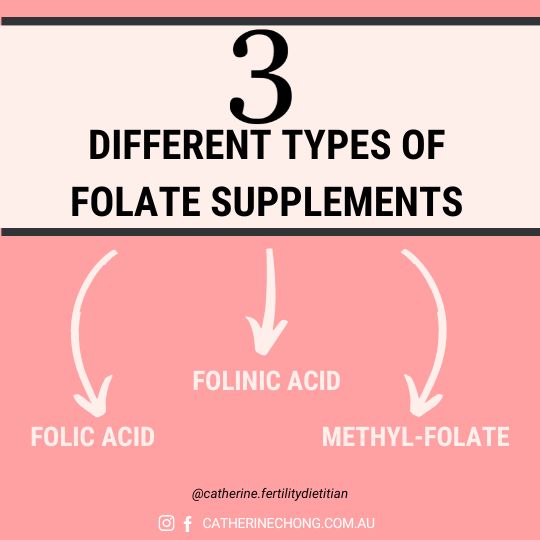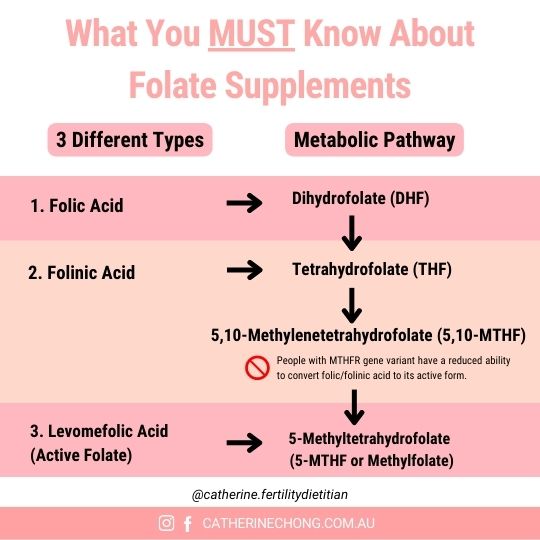Methylfolate vs. Folic Acid: Finding The Best folate Supplement For Pregnancy
Newer ‘activated folate’ supplements, such as methylfolate, are gaining popularity, especially for women with genetic variations, such as specific MTHFR gene variants, that make it harder for their bodies to process folic acid.
Choosing the right folate supplement is crucial when preparing for a healthy pregnancy. You may already be familiar with the benefits of folic acid in preventing neural tube defects (NTDs), which occur when the neural tube doesn’t close properly during early pregnancy and affects the brain and spine.
This blog will explore the key differences between folic acid and methylfolate, helping you consider the best supplement before conception and for pregnancy.
What is Folate?
Folate is a group of essential compounds that make up vitamin B9, crucial for many bodily functions, including cell growth and DNA production. It naturally occurs in leafy greens, beans, and citrus fruits. Folate can also be found in supplement forms, such as folic acid, folinic acid, and methylfolate. Each form serves the same purpose, though some, like methylfolate, maybe more efficiently utilised by the body, especially for those with certain genetic variations like MTHFR.

Different Types of Folate Supplements
For women trying to conceive, achieving optimal folate level is essential, particularly in the six months leading up to and throughout pregnancy. Adequate folate intake supports healthy fetal development, helps prevent neural tube defects, and is crucial for overall reproductive health.

Key Differences Between Methylfolate And Folic Acid
1. What is Folic Acid?
Folic acid is a synthetic form of folate that needs to be converted by the body into its active form.
2. What is Methylfolate?
Methylfolate, or activated folate, is the bioavailable form of folate. It bypasses the need for conversion, making it a better option for those with genetic factors that impair folic acid metabolism.
3. What About Folinic Acid?
Folinic acid is not fully activated. Before the body can utilise it, folinic acid follows a metabolic pathway like folic acid.
Overconsumption of Folic Acid: Potential Risks
Adequate folic acid intake is pivotal to preventing neural tube defects, especially before and in the early months of pregnancy. However, consuming excessive amounts can be detrimental. The current upper limit of folic acid intake is 1,000 mcg daily (including from fortified foods and supplement sources).
One of the well-known risks of excess folic acid intake is its ability to mask the symptoms of vitamin B12 deficiency. This can delay diagnosis and treatment, leading to potential irreversible neurological damage, particularly in pregnant women or infants whose B12 status might already be low.
The issue surrounding folic acid and its association with UMFA (unmetabolised folic acid) syndrome is also starting to gain concern, as UMFA has been detected in the umbilical cord of the fetus and even in infants’ blood.
One recent study compared the effects of folic acid and methylfolate on blood folate status during pregnancy. Sixty pregnant women were randomised to receive either 600 mcg per day of folic acid or methylfolate for 16 weeks. Blood samples were collected at baseline and after 16 weeks to measure erythrocyte folate, serum folate, and plasma UMFA.
The results showed no significant difference between the two groups regarding erythrocyte and serum folate levels. However, plasma UMFA concentrations were significantly higher in the folic acid group compared to the methylfolate group, with a 0.6 nmol/l increase. This suggests that methylfolate may reduce UMFA levels by about 50% compared to folic acid. The clinical significance of this reduction in UMFA is not yet clear, and further research is needed to determine its impact on pregnancy outcomes.
Which Folate Supplement is Best for You?
While research on the benefits of methylfolate supplementation continues, folic acid remains the only proven form that effectively protects against neural tube defects (NTDs).
Global health guidelines recommend that all women trying to conceive take 400 mcg of folic acid daily to help prevent NTDs, even if they have an MTHFR variant, until the first three months of the pregnancy. Depending on your health profile, some individuals may require higher folate supplementation.
Given the importance of proper type, dose and duration of folate supplementation, it’s crucial to consult a fertility dietitian who can assess your unique needs and provide tailored advice on the most appropriate supplement regimen.
Check out our previous blog for more information on the effect of MTHFR gene mutations on fertility.
Bottom Line
- Folate is vital for a healthy pregnancy, and folic acid is the only clinically proven supplement that prevents neural tube defects at least a month before conception till the first trimester.
- If you have the MTHFR gene variant or certain health conditions like diabetes or coeliac disease, you may require a higher dose of folate. Considering methylfolate may be beneficial.
- Suppose you’ve been taking a high dose of folic acid for an extended period. It will be best to consult a fertility dietitian to review your needs and get personalised advice on the most appropriate supplementation plan.
